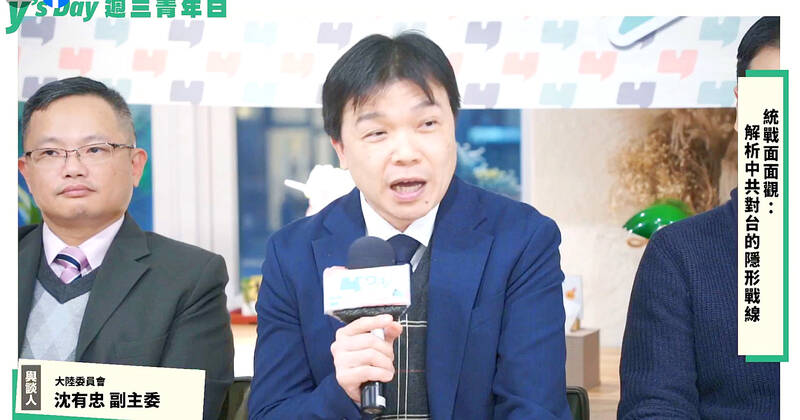Cross-strait interaction is becoming increasingly unilateral, with China treating any interaction as an opportunity to advance its “united front” rhetoric, Mainland Affairs Council Deputy Minister Shen You-chung (沈有忠) said yesterday at the Y’s Day Forum held by the Taiwan Public Welfare group.
The Chinese Communist Party’s (CCP) “united front” strategy includes manipulating local elections, as evidenced in 2018 and 2022, and attempts to diminish the efficiency of the administration through legislative red tape.
While there were visible CCP influences in the legislature affecting cross-strait interaction, such issues were also tied to the ideologies of Taiwanese political parties, Shen said.

Photo: Screen grab from a livestream
Shen cited Kinmen County as a sign that the CCP is strengthening its influence on local governments.
The CCP hopes to use Kinmen to rekindle support for its “one country, two systems” framework, as the credibility of the concept tanked after China’s blatant intervention in Hong Kong, Shen said.
The CCP is mulling the possibility of allowing Kinmen residents to purchase real estate in Xiamen and giving them voting rights, forming a de facto “one country, two systems” template, Shen said, adding that the Kinmen-Xiamen card, and increased convenience of travel and shopping in Xiamen have benefited the “united front” strategy in Kinmen.
The idea is to create a belief that if Kinmen could achieve prosperity from Chinese benefits, there is no reason why Taiwan as a whole could not, Shen said.
Beijing is also stepping up its efforts to win over the hearts and minds of young Taiwanese, providing many benefits for Taiwanese to start businesses in China, Shen said.
However, it is a honey trap, he added.
China has high unemployment rates and offering benefits to Taiwanese at such a juncture suggests an ulterior motive, such as allowing Taiwanese to introduce business start-up models and later forcing them out with cutthroat pricing, Shen said.
Additionally, despite China’s known atheism, it continues to manipulate religion as a tool to conduct “united front” rhetoric, Shen said.
The CCP says that all Matsu temples in Taiwan originated from the original temple in Meizhou, in China’s Fujian Province, and that all temples should visit the original temple once and obtain a certificate that shows that their temple is a “certified and legal” Matsu temple, Shen said.
The process could be applied to the worship of Guangong (關公) or other deities, Shen added.
The council said that cross-strait interactions should not deviate from approved actions in Taiwan, there should be no promotion of political views or denigration of Taiwan, and that visiting Chinese officials should not accept media interviews.

Taiwan would benefit from more integrated military strategies and deployments if the US and its allies treat the East China Sea, the Taiwan Strait and the South China Sea as a “single theater of operations,” a Taiwanese military expert said yesterday. Shen Ming-shih (沈明室), a researcher at the Institute for National Defense and Security Research, said he made the assessment after two Japanese military experts warned of emerging threats from China based on a drill conducted this month by the Chinese People’s Liberation Army’s (PLA) Eastern Theater Command. Japan Institute for National Fundamentals researcher Maki Nakagawa said the drill differed from the

‘WORSE THAN COMMUNISTS’: President William Lai has cracked down on his political enemies and has attempted to exterminate all opposition forces, the chairman said The legislature would motion for a presidential recall after May 20, Chinese Nationalist Party (KMT) Chairman Eric Chu (朱立倫) said yesterday at a protest themed “against green communists and dictatorship” in Taipei. Taiwan is supposed to be a peaceful homeland where people are united, but President William Lai (賴清德) has been polarizing and tearing apart society since his inauguration, Chu said. Lai must show his commitment to his job, otherwise a referendum could be initiated to recall him, he said. Democracy means the rule of the people, not the rule of the Democratic Progressive Party (DPP), but Lai has failed to fulfill his

A rally held by opposition parties yesterday demonstrates that Taiwan is a democratic country, President William Lai (賴清德) said yesterday, adding that if opposition parties really want to fight dictatorship, they should fight it on Tiananmen Square in Beijing. The Chinese Nationalist Party (KMT) held a protest with the theme “against green communists and dictatorship,” and was joined by the Taiwan People’s Party. Lai said the opposition parties are against what they called the “green communists,” but do not fight against the “Chinese communists,” adding that if they really want to fight dictatorship, they should go to the right place and face

A 79-year-old woman died today after being struck by a train at a level crossing in Taoyuan, police said. The woman, identified by her surname Wang (王), crossed the tracks even though the barriers were down in Jhongli District’s (中壢) Neili (內壢) area, the Taoyuan Branch of the Railway Police Bureau said. Surveillance footage showed that the railway barriers were lowered when Wang entered the crossing, but why she ventured onto the track remains under investigation, the police said. Police said they received a report of an incident at 6:41am involving local train No. 2133 that was heading from Keelung to Chiayi City. Investigators